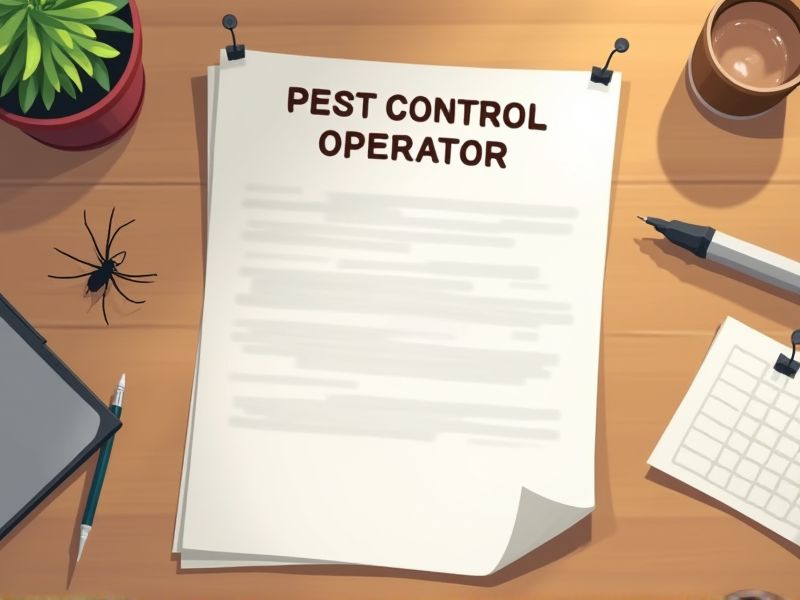
Pest control operators must have certifications to ensure they possess the necessary knowledge to handle chemicals safely; this reduces the risk of harm to non-target organisms and the environment. Regulations in the pest control industry require operators to be trained and certified to comply with legal standards, ensuring quality and effectiveness. Certification programs often cover best practices, new methodologies, and latest technologies, which are critical for successful pest management. Important certifications for a Pest Control Operator might include these essential credentials.
State Pest Control Operator License
Acquiring a State Pest Control Operator License ensures that operators meet specific training and knowledge requirements, thereby maintaining industry standards. This license enforces legal compliance, reducing the risk of harm to people and the environment from improper pesticide use. It provides a formal mechanism for accountability, ensuring that operators adhere to regulated practices. Holding this license can enhance customer trust, as it signifies a recognized level of professional competence.
Pesticide Applicator License
To ensure public safety, a Pesticide Applicator License verifies that a pest control operator possesses the necessary knowledge to handle and apply pesticides correctly. This licensing reduces the risk of environmental contamination, as certified operators are trained to follow regulations for safe chemical use. Licensure guarantees compliance with government standards, decreasing the likelihood of legal repercussions due to improper pesticide application. The presence of a license instills customer confidence, as it signifies a professional level of competence and reliability in pest management services.
Restricted Use Pesticide (RUP) Certification
Restricted Use Pesticide (RUP) Certification ensures that pest control operators have the necessary knowledge to handle hazardous substances safely, minimizing risks to human health and the environment. This certification mandates that operators understand application techniques, preventing misuse that can lead to environmental contamination or harm to non-target species. Compliance with state and federal regulations is a critical component, as it helps ensure that pesticide usage aligns with legal and safety standards. Certification requirements can also contribute to enhancing public trust in pest control practices by demonstrating a commitment to safety and efficacy.
Structural Pest Control Operator License
A Structural Pest Control Operator License is required because it ensures the operator understands the safe use of pesticides and complies with regulatory standards. Without this license, operators may lack adequate knowledge, potentially leading to ineffective pest management and environmental harm. The license serves as a benchmark, assuring clients of the operator's expertise and adherence to industry best practices. With regulatory accountability, operators can maintain public health and safety by effectively managing pest-related risks.
Integrated Pest Management (IPM) Certification
Integrated Pest Management (IPM) Certification ensures that pest control operators follow sustainable and environmentally friendly practices, minimizing harm to non-target species and ecosystems. It enhances trust with consumers by demonstrating a commitment to safe and effective pest management solutions. Certification provides operators with up-to-date knowledge on the latest pest control technologies and strategies, improving their effectiveness. Regulatory bodies often require certified operators to ensure compliance with legal standards, reducing liability and enhancing professionalism in the industry.
EPA Pesticide Application Certification
The EPA Pesticide Application Certification is necessary because it ensures that pest control operators have the knowledge to use pesticides safely, minimizing risks to human health and the environment. Without this certification, operators might use improper techniques, leading to ineffective pest control and possible contamination. Certified professionals are better equipped to adhere to legal and safety standards, reducing legal liabilities for their businesses. Certification also fosters public trust, as clients are more likely to hire operators who have verified their competence through a recognized authority.
NPMA Certified Pest Management Professional
A NPMA Certified Pest Management Professional ensures adherence to industry standards, enhancing safety and efficacy in pest control operations. Certification signifies specialized knowledge, allowing operators to effectively manage and eradicate pests. Consumers are likely to trust certified professionals, leading to increased client satisfaction and business growth. Certified professionals remain updated on the latest pest control techniques, reducing risks associated with outdated or ineffective methods.
Commercial Pesticide Technician Certification
Commercial pesticide technician certification is required for pest control operators because it ensures they possess the necessary knowledge to use chemicals safely and effectively. Using pesticides without proper certification can lead to misuse, harming both the environment and human health. Certification also provides operators with up-to-date training on regulatory compliance, reducing the risk of legal and financial penalties. Certified technicians are better equipped to handle pesticide-related challenges, improving service quality and customer trust.
OSHA Pesticide Safety Certification
OSHA Pesticide Safety Certification is essential for pest control operators to ensure they comply with federal safety regulations, which reduces the risk of legal penalties. Certification provides operators with knowledge about proper pesticide handling, minimizing health risks to themselves and others. By being certified, operators can effectively identify hazardous conditions and implement corrective measures, leading to safer environments. Having OSHA certification often boosts credibility, resulting in increased customer trust and potential business growth.
Hazardous Materials Management Certification
Hazardous Materials Management Certification ensures that a pest control operator understands how to safely handle, store, and dispose of potentially dangerous chemicals, reducing the risk of accidental exposure or environmental contamination. Proper certification enhances compliance with local and federal regulations, allowing operators to avoid legal penalties and maintain their licenses. Knowledge gained from certification improves the operator's ability to protect public health by effectively targeting pests without unnecessary harm to humans or wildlife. Certification fosters consumer trust, as clients are more likely to rely on services by operators who demonstrate a commitment to safety and professionalism.
Summary
When you engage a certified Pest Control Operator, expect enhanced service quality due to standardized training. Certification ensures these operators use environmentally safe methods, reducing potential harm to you and your surroundings. Professional expertise leads to efficient pest management, minimizing recurrence and saving on future costs. You also gain peace of mind knowing that a certified professional complies with industry regulations and safety standards.
